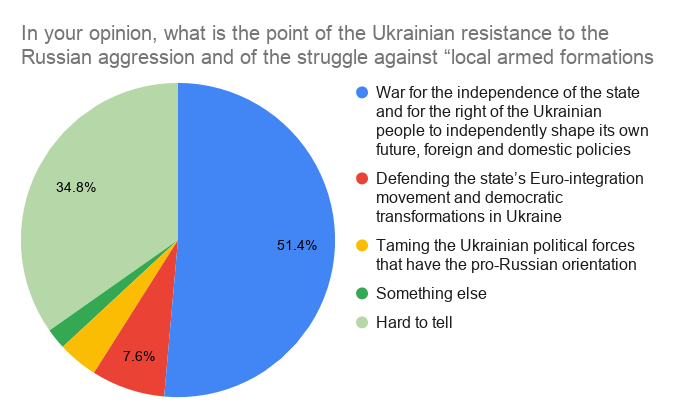This and other findings related to resolving the conflict in the Donbas are revealed in an opinion poll conducted by the Ilko Kucheriv Democratic Initiatives Foundation (DI) and the Kyiv International Institute of Sociology. The study was carried out in 110 locations in all the oblasts of Ukraine (with the exception of occupied Donbas and Crimea). Iryna Bekeshkina, head of the DI, stressed that a non-tolerant position toward the militants prevails in all regions of Ukraine, including eastern Ukraine, where 45% do not support a full amnesty.
Only 14% of respondents think that any compromise is acceptable for peace. Compared to June 2019, this opinion has decreased by 6%. Almost 60% believe there should be some compromises for reaching peace, but not a carte blanche.

According to the poll, the biggest share of those prepared for any compromise is among the voters of the pro-Russian Opposition Platform for Life party (33%).
The study shows that Ukrainians consider the majority of compromises Russia is pressing for referring to the Minsk protocol unacceptable as well. These include:
- holding local elections under conditions demanded by the Russian-backed militants - before Ukraine gains control of the border (unacceptable for 66%, acceptable for 16%);
- a full amnesty for combatants against Ukrainian forces (unacceptable for 66%, acceptable for 19%);
- forming law enforcement bodies for the temporarily occupied parts of Luhansk and Donetsk oblasts solely from local citizens (unacceptable for 56%, acceptable for 21%).
On the whole, southern and eastern regions of Ukraine are more willing to compromise. Both regions are more supportive than other regions of enshrining a “special status” for the Donbas in the Ukrainian Constitution - 41% in southern Ukraine and almost 54% in eastern. 60% of respondents from the two regions agree on a neutral or non-bloc status.
Respondents considered re-establishing “normal life” in the liberated territories (32%) and international pressure on Russia (32%) as the most effective ways to achieve peace. 15% also considered giving the so-called Donetsk and Luhansk "people's republics (“DNR” and “LNR”) a special status within Ukraine an effective measure in attaining peace. 22% were undecided.
The poll shows that 62% of Ukrainians prefer the “DNR” and “LNR” being returned to Ukraine on the same terms as before. More and more people support this position as time passes. 4% support the separation of the territories from Ukraine. 22% think these territories should receive more independence from the central government but still remain part of Ukraine.
The majority of respondents support the presence of peacekeeping forces in the “DNR” and “LNR” (59%). Of the respondents, eastern Ukrainians are the least supportive (47%).
Most respondents supported the disengagement of military forces at the frontline initiated by President Zelenskyy (60% positive and 27% negative). Numbers were higher in the eastern and southern regions, with 74% of southern respondents supporting disengagement. Supporters of the Opposition Platform for Life support disengagement almost unanimously (90%), while 69% of supporters of Volodymyr Zelenskyy’s Servant of the People support disengagement and 20% do not. Of those who voted for ex-president Petro Poroshenko’s European Solidarity party are mostly opposed toward disengagement -- 72% against and 19% for.
The biggest share of respondents (45%) define the Donbas conflict as Russian aggression against Ukraine with the involvement of local militants. 30% think the Russian invasion was aimed at conquering the Ukrainian state and adding it to the sphere of Russian influence.

The majority of Ukrainians believe the purpose of fighting Russian aggression is to regain territorial integrity and uphold the sovereignty of Ukraine within its recognized international borders (39%) and defending the independence and the right of Ukrainians to define their future independently (31%). 21% of respondents left the question unanswered.
A significant share of respondents (29%) think the real interests of Donbas separatists are about money - they believe Russia pays them for their revolt.

The survey was conducted between 4 to 19 November and was funded by the Delegation of the European Union to Ukraine. During the research study, 2,041 questionnaires were completed. Accepted survey practice is to consider the percentage of error as 2.3%.
Read more:
- More than half of Ukrainians see Ukraine’s future in EU, only 13% with Russia: Poll
- New poll results suggest where Russia and Ukraine are heading
- Majority of Ukrainians optimistic about country’s politics for first time in country’s history
- NATO officially gives Ukraine aspiring member status; membership action plan is next ambition (2018)
- Support for joining NATO at a historical high in Ukraine | Infographic (2017)
- Ukraine now more supportive of NATO than Visegrad EU countries (2017)
- Poll results: Slight improvement amid national pessimism in Ukraine, positive local outlook
- What Ukrainians really think: 10 key insights from Ukraine’s 2017 opinion polls
- 30% of Europeans think Ukraine should become part of EU to deter Russian aggression, new poll finds (2015)

